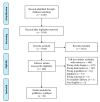Text Messaging in Cancer-Supportive Care: A Systematic Review
- PMID: 34298756
- PMCID: PMC8307703
- DOI: 10.3390/cancers13143542
Text Messaging in Cancer-Supportive Care: A Systematic Review
Abstract
The global cancer disease burden is substantial, resulting in increased economic and clinical strain on our healthcare systems. A proposed solution is text-based communication, which can be used for cancer-supportive care. We conducted a systematic review to synthesize and describe the use of text-based communications for cancer-supportive care. Our population of interest included adult patients with cancer. A total of 18 studies were included in the review: 9 RCTs and 9 non-randomized interventional/observational studies. Patients were largely satisfied with text-based communication during their cancer care. Compared to controls, results for other outcomes including symptoms and quality of life were largely mixed; however, no harms were observed. Furthermore, positive outcomes were seen for specific interventions, such as text message medication reminders. These findings should be considered with caution due to the considerable heterogeneity observed between studies regarding their design and reported outcomes and the high risk of bias associated with 6/18 studies. Overall, this review suggests that text-based communication may be a complementary tool for cancer-supportive care; however, more research is needed to examine the feasibility of implementation and use.
Keywords: cancer; mHealth; supportive care; systematic review; text messaging; text-based communication.
Conflict of interest statement
The authors declare no conflict of interest.
References
-
- Society C.C. Supportive Care. [(accessed on 3 May 2021)]; Available online: https://www.cancer.ca/en/cancer-information/cancer-type/brain-spinal-chi....
-
- Nipp R.D., El-Jawahri A., Moran S.M., D’Arpino S.M., Johnson P.C., Lage D.E., Wong R.L., Pirl W.F., Traeger L., Lennes I.T. The relationship between physical and psychological symptoms and health care utilization in hospitalized patients with advanced cancer. Cancer. 2017;123:4720–4727. doi: 10.1002/cncr.30912. - DOI - PMC - PubMed
Publication types
Grants and funding
LinkOut - more resources
Full Text Sources


